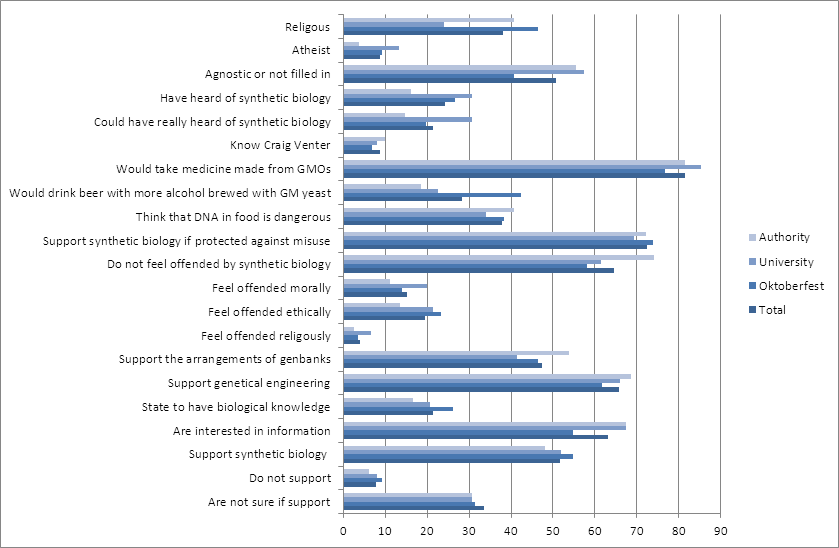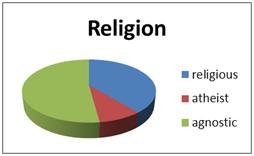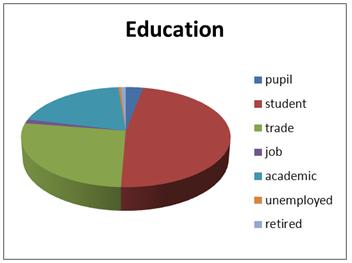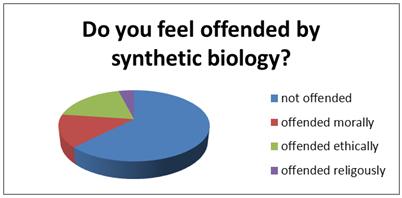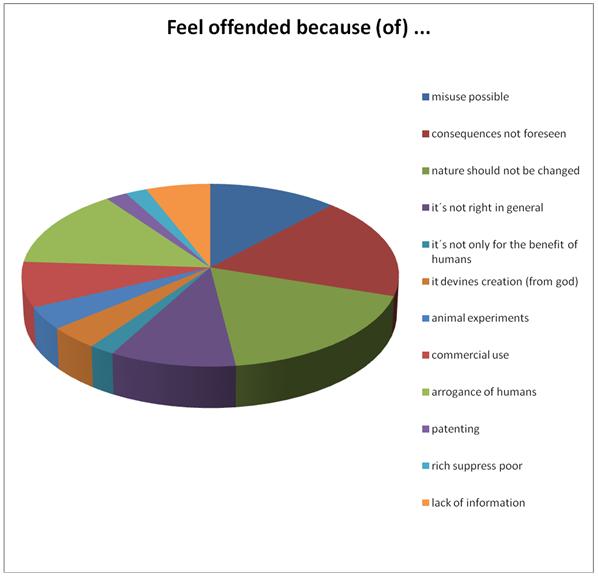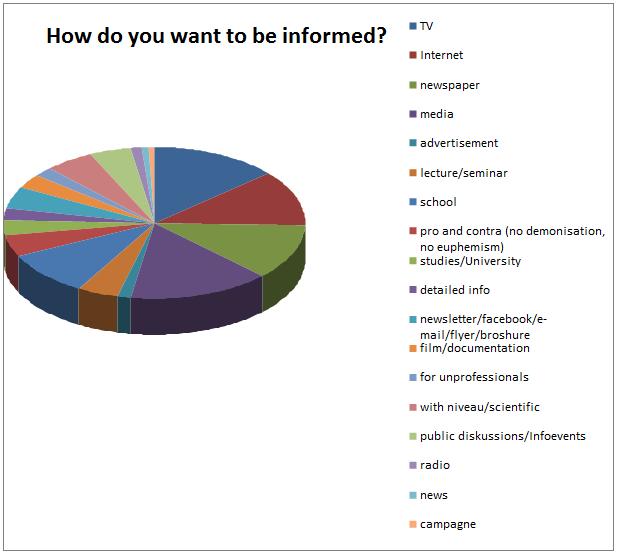Team:LMU-Munich/HumanPractice
From 2010.igem.org
(→Human Practice) |
(→conclusion) |
||
| (65 intermediate revisions not shown) | |||
| Line 2: | Line 2: | ||
{{:Team:LMU-Munich/Templates/Page Header}} | {{:Team:LMU-Munich/Templates/Page Header}} | ||
| - | =Human Practice= | + | ==<font color="#9933CC">'''Human Practice'''</font>== |
| - | When we were thinking about | + | When we were thinking about human practice, we first wanted to present synthetic biology, the iGEM competition and our team at a stand in the middle of Munich. But whilst discussing what information we wanted to provide, we recognized that we didn't know what people already knew about this topic. |
| - | So we changed our plans and conducted a survey | + | So we changed our plans and conducted a survey to find out. |
| - | We asked people | + | We asked people about their opinion on several topics, including multiple questions regarding their understanding of a wider range of issues within the general study of molecular biology. To incorporate a broad range of views, and to gain a fair reperesntation of different groups in society, we asked people at Oktoberfest, at the University of Munich and an local bureaucratic authority. |
| - | For the | + | For the English version of our original questionaire, please click |
| - | + | <html> | |
| - | + | <a href="https://static.igem.org/mediawiki/2010/d/d9/IGEM-Umfragefertigenglisch.pdf">here</a href></html>. We also distributed a german version. | |
| - | The | + | The results of our survey turned out very interesting. |
| - | + | We also had a few interviews: | |
| - | + | Deutschlandradio Kultur | |
| + | |||
| + | Biotechnologie TV http://www.biotechnologie.de/BIO/Navigation/DE/root,did=117452.html | ||
| + | |||
| + | Süddeutsche Zeitung / Bayerischem Rundfunk ...will come soon... | ||
| + | |||
| + | ==Evaluation== | ||
| + | In total we asked 242 people, with an average age of 25 years. Interestingly, a little over 51 % would support further research in synthetic biology and only about 8% would not. The rest were undecided. If misuse of such research was not an issue i.e. it was impossible, 72.3% would support synthetic biology after all. So let's take a closer look at the data to find out, why they don't want to support it and what they know about it. | ||
| + | |||
| + | Generally, when we asked them what they felt were possible misuses of synthetic biology, we got a huge amount of answers. 54.1% of all participants answered that question. The most common answers were the following (we sorted them into several categories): Fear of terrorism, weapons in general, commercial use, improving humans, cloning... | ||
| + | |||
| + | About 63% wished to be better informed espacially via TV, radio, newspapers and the internet. Some of them wanted scientific information whereas others wanted general information, explained in an easy way. | ||
| + | [[Image:Beer.jpg|70px|right]] | ||
| + | |||
| + | ==Oktoberfest== | ||
| + | Yes, we know it is a quite strange idea to go to a crowded place, where everyone goes just to drink beer and have fun, and ask question about such a sophisticated topic as synthetic biology. | ||
| + | |||
| + | But the temptation of asking around at Oktoberfest is that it is quite an international affair, in spite of the fact that began as a typically bavarian tradition. Together with the fact that we thought we would meet quite a broad range of people, and that they might be even more honest having a high blood alcohol percentage, we thought it would be an interesting and maybe quite a fun place to go with this survey. | ||
| + | |||
| + | And moreover it was the 200th anniversary of this tradition, so it had to be good ... | ||
| + | |||
| + | We asked 86 people at Oktoberfest with an average age of 26 years. Sadly it wasn't as international as we hoped ... for that we should have gone to the "Festzelt" (tent were you drink beer and dance drunk on the ale-bench) ... but we did get 13 different nationalities: | ||
| + | |||
| + | *German (of course) | ||
| + | *Italien | ||
| + | *Libanese | ||
| + | *Australien | ||
| + | *Austrian | ||
| + | *English | ||
| + | *Danish | ||
| + | *Indish | ||
| + | *Indonesien | ||
| + | *South African | ||
| + | *Turkish | ||
| + | *American | ||
| + | *Dutch | ||
| + | [[Image:Hat.jpg|100px|right]] | ||
| + | |||
| + | ==University== | ||
| + | |||
| + | Of course being students ourselves, we also wanted to check out what other students thought about the idea of synthetic biology. It also entered our mind that university students obviously have a high standard of education or are at least more likely to be willing to engage in academic or intellectual thought processes. This is probably in contrast to what one might find at Oktoberfest. | ||
| + | |||
| + | Our theory in this case stemmed from the idea that often people who aren't informed about a particular subject are more likely to have a negative perception of it, and therefore more likely to have more angst towards it. In summary we were testing a hypothesis that there might be a correlation between education and knowledge about this area of study and support for its further development. | ||
| + | |||
| + | We asked 75 people with an average age of 24 years. Even though we didn't expect it we also found 3 extra nationalities to add to our list: | ||
| + | *Canadian | ||
| + | *Venezuelan | ||
| + | *French | ||
| + | [[Image:Stamp.jpg|100px|right]] | ||
| + | |||
| + | ==Local bureaucratic authority== | ||
| + | |||
| + | We did find a wide sample at the Oktoberfest, but as many of them were a bit drunk, we had to find another area with a high number of visitors. They were also not allowed to all belong to one particular social group, class or profession. So we considered going to our local council (Münchener Kreisverwaltungsreferat), and as people have to wait there for quite a while ... we came up with an idea: perfect, let's sugar the pill and shorten there waiting time with a little synthetic biology. | ||
| + | |||
| + | We asked 81 people with an average age of 33 years. And we again found 5 more nationalities: | ||
| + | *Bosnian | ||
| + | *Greek | ||
| + | *Nepalian | ||
| + | *Kosovan | ||
| + | *Marrocan | ||
| + | |||
| + | ==Data== | ||
| + | Surprisingly looking at the data there wasn't as a severe difference between the three locations as we would have expected. | ||
| + | |||
| + | |||
| + | [[image:umfrage1.png|700px|survey results]] | ||
| + | |||
| + | A few interesting results: | ||
| + | |||
| + | *At Oktoberfest 42% would go for the beer with higher alcohol compared to overall only 28%. (well maybe not that surprising ...) | ||
| + | *At Oktoberfest 27% indicated that they had heard of synthetic biology, but when we took a closer look at their following answers we realised that only 20% might have really heard of synthetic biology ... this shows the overestimating effect of alcohol. | ||
| + | *31% of people had heard of synthetic biology at the university, this was much more than at Oktoberfest. | ||
| + | *Only 16% had heard of synthetic biology at the local council | ||
| + | *Only 24% at the university were religious compared to the overall figure of 38% ... | ||
| + | *Not interesting, but a difference: 100% of those from the university were students ... | ||
| + | |||
| + | |||
| + | |||
| + | |||
| + | So we will now only show the overall data, as there really was not such a difference between the three locations. Let's first go through the questions and then we will go to special correlations between different answers. | ||
| + | |||
| + | * Religious belief: just a short diagram showing the three groups religious (all religions were considered), atheist and agnostic (which was also considered if no statement was made or the field crossed): | ||
| + | |||
| + | [[Image:religious.jpg]] | ||
| + | |||
| + | * Profession: again a diagram showing the different groups we devided them into: | ||
| + | |||
| + | [[Image:profession.jpg]] | ||
| + | |||
| + | * heard of synthetic biology: 21%, after taking away those who gave wrong notations for synthetic biology, stated that they have heard of synthetic biology | ||
| + | |||
| + | * knows Craig Venter: we included this question to exclude those who have only heard of synthetic biology from those who really know the subject. Sadly only 9% stated that they knew who Craig Venter was, some even that hadn't heard of synthetic biology, so that wasn't a good criteria | ||
| + | |||
| + | * would take medicine created by synthetic biology if had a serious desease: 81% said they would do so | ||
| + | |||
| + | * would drink beer with higher alcohol percentage created by synthetic yeast: 28% would go for the beer | ||
| + | |||
| + | * would support research in synthetic biology if protected from misuse: 73% would do so | ||
| + | |||
| + | * what would be such a misuse: a graph showing the result, but we needed to categorise the fears: | ||
| + | |||
| + | [[Image:Fear.jpg]] | ||
| + | |||
| + | * Are they offended by synthetic biology (ethically, morally or religiously): again a graph to illustrate the result | ||
| + | |||
| + | [[Image:Offended.jpg]] | ||
| + | |||
| + | * Why are they offended: again another graph | ||
| + | |||
| + | [[Image:offendedbecause.jpg]] | ||
| + | |||
| + | * Do they think the arrangement of gene banks is a good idea: 47% say yes it is a good thing, against the rest who finds it quite frightening | ||
| + | |||
| + | * Do they feel themselves well equiped with knowledge to such biological topics: 21% say yes | ||
| + | |||
| + | * Interested in further information: 63% say so and this is how they wish to be informed: | ||
| + | |||
| + | [[Image:Informed.jpg]] | ||
| + | |||
| + | * Would they support further research in the field of synthetic biology: 52% say yes, 8% say no and 33% are not sure (yet) and the rest didn't state their opinion | ||
| + | |||
| + | ==Correlations== | ||
| + | |||
| + | <b>Religous belief correlated to support of synthetic biology</b> | ||
| + | |||
| + | As we thought that people who are religious might feel offended by synthetic biology, we wanted to take a closer look at it, to see if it was really so. | ||
| + | |||
| + | |||
| + | |||
| + | *Of all the people who indicated themselves as religious 43% would support, 15% wouldn't support and 15% weren't sure if they would support... | ||
| + | *Of all the people who indicated themselves as atheists 48% would support, 5% wouldn't support and 2% weren't sure if they would support... | ||
| + | *Of all the people who indicated themselves as agnostic or didn't indicate themselves 59% would support, 2% wouldn't support and 33% weren't sure if they would support... | ||
| + | |||
| + | ... research in the field of synthetic biology | ||
| + | |||
| + | |||
| + | |||
| + | There seems to be a slight tendency,for people who are religious to show less support for the research, but it isn't really a large difference | ||
| + | |||
| + | |||
| + | |||
| + | <b>Profession correlated to support of synthetic biology</b> | ||
| + | |||
| + | We thought that profession might influence how people think about specific subjects. For example people, who work in a trade might not feel as much association to such scientific fields as someone who is himself an academic. | ||
| + | |||
| + | |||
| + | |||
| + | *Of all the people who were students 55% would support, 6% wouldn't support and 32% weren't sure if they would support... | ||
| + | *Of all the people who worked in a trade 40% would support, 11% wouldn't support and 44% weren't sure if they would support... | ||
| + | *Of all the people who were academics 61% would support, 4% wouldn't support and 28% weren't sure if they would support... | ||
| + | |||
| + | ... research in the field of synthetic biology | ||
| + | |||
| + | |||
| + | |||
| + | People working in a trade really do seem to support it less and more of them are unsure than in the other two categories. But again it is not such a big difference. | ||
| + | |||
| + | |||
| + | |||
| + | <b>Profession correlated to if they think DNA in food is dangerous</b> | ||
| + | |||
| + | We thought maybe that educational status might correlate with how much they are informed about such topics and used this question as an indication for this. | ||
| + | |||
| + | |||
| + | *Of all the people who were students 27% thought DNA was dangerous, 64% thought it wasn't and 4% weren't sure | ||
| + | *Of all the people who worked in a trade 48% thought DNA was dangerous, 47% thought it wasn't and 3% weren't sure | ||
| + | *Of all the people who were academics 39% thought DNA was dangerous, 43% thought it wasn't and 2% weren't sure | ||
| + | |||
| + | |||
| + | |||
| + | Here it seems quite clear that those working in a trade were less informed about such topics. Also academics weren't as informed as students. This could explain why less people working in a trade would support such research and why so many are unsure about such topics, as they aren't well enough informed. | ||
| + | |||
| + | <b>If they think DNA in food is dangerous correlated with if they support synthetic biology</b> | ||
| + | |||
| + | Here we wanted to test the theory, that people who are badly informed or even scared of such biological topics will support it less be more unsure of what they should think about it. | ||
| + | |||
| + | |||
| + | |||
| + | *Of all the people who thought DNA was dangerous 33% would support, 13% would not support and 45% aren't sure if they would support ... | ||
| + | *Of all the people who thought DNA wasn't dangerous 66% would support, 5% would not support and 26% aren't sure if they would support ... | ||
| + | |||
| + | ... research in the field of synthetic biology | ||
| + | |||
| + | |||
| + | |||
| + | This shows that our theory seems right and that insecurity on such topics leads to disaproval or even more insecurity in terms of whether they support it or not. | ||
| + | |||
| + | |||
| + | <b>If they would take medicine created by synthetic biology correlated to support of synthetic biology</b> | ||
| + | |||
| + | We thought that those who would take such medicine, should also be for further research, as only if so would it be possible to create such medicine, but not all were | ||
| + | |||
| + | |||
| + | |||
| + | *Of all the people who would take such medicine 56% would support, 5% wouldn't support and 33% weren't sure if they would support... | ||
| + | *Of all the people who wouldn't take such medicine 32% would support, 24% wouldn't support and 23% weren't sure if they would support... | ||
| + | |||
| + | |||
| + | ... research in the field of synthetic biology | ||
| + | |||
| + | |||
| + | |||
| + | <b>Support of genitical engeneering correlated with support of synthetic biology</b> | ||
| + | |||
| + | We wanted to check if there were any "new opposers" or if all those who were against genetical engeneering also were against synthetic biology, as these two research fields relate to each other. | ||
| + | |||
| + | |||
| + | |||
| + | *Of all the people who support genetical engineering 68% would support, less than 1% wouldn't support and 28% weren't sure if they would support... | ||
| + | *Of all the people who don't support genetical engineering 15% would support, 27% wouldn't support and 55% weren't sure if they would support... | ||
| + | |||
| + | |||
| + | ... research in the field of synthetic biology | ||
| + | |||
| + | And also of all who wouldn't support synthetic biology, 79% also don't support genetical engineering. So only 21% are "new opponents" seeing new problems in synthetic biology. | ||
| + | But also some who don't support genetical engineering would support synthetic biology. | ||
| + | |||
| + | ==Conclusion== | ||
| + | |||
| + | All in all many of the people we asked weren't informed on the topic of synthetic biology, but they were interested in getting further information. This could be realised by education in school and university, but also by infoevents and public discussions. | ||
| + | |||
| + | Due to the lack of knowledge there seemed to be a uncertainty whether to support research or not. | ||
| + | |||
| + | Many who didn't want to support synthetic biology also didn't support genetical engineering. This is due to the problems and risks that are connected with manipulating organism. But also a few against genetical engineering were also for synthetic biology showing that many didn't feel a direct risk to their life by synthetic biology as with e.g. open field experiments of genetical engineering and mosanto. | ||
| + | |||
| + | But at the end we gained a very positive picture and this could be improved if people would be better informed on synthetic biology. | ||
<!-- Include the next line at the end of every page --> | <!-- Include the next line at the end of every page --> | ||
{{:Team:LMU-Munich/Templates/Page Footer}} | {{:Team:LMU-Munich/Templates/Page Footer}} | ||
Latest revision as of 20:29, 27 October 2010
When we were thinking about human practice, we first wanted to present synthetic biology, the iGEM competition and our team at a stand in the middle of Munich. But whilst discussing what information we wanted to provide, we recognized that we didn't know what people already knew about this topic.
So we changed our plans and conducted a survey to find out.
We asked people about their opinion on several topics, including multiple questions regarding their understanding of a wider range of issues within the general study of molecular biology. To incorporate a broad range of views, and to gain a fair reperesntation of different groups in society, we asked people at Oktoberfest, at the University of Munich and an local bureaucratic authority.
For the English version of our original questionaire, please click
here. We also distributed a german version.
The results of our survey turned out very interesting.
We also had a few interviews:
Deutschlandradio Kultur
Biotechnologie TV http://www.biotechnologie.de/BIO/Navigation/DE/root,did=117452.html
Süddeutsche Zeitung / Bayerischem Rundfunk ...will come soon...
In total we asked 242 people, with an average age of 25 years. Interestingly, a little over 51 % would support further research in synthetic biology and only about 8% would not. The rest were undecided. If misuse of such research was not an issue i.e. it was impossible, 72.3% would support synthetic biology after all. So let's take a closer look at the data to find out, why they don't want to support it and what they know about it.
Generally, when we asked them what they felt were possible misuses of synthetic biology, we got a huge amount of answers. 54.1% of all participants answered that question. The most common answers were the following (we sorted them into several categories): Fear of terrorism, weapons in general, commercial use, improving humans, cloning...
About 63% wished to be better informed espacially via TV, radio, newspapers and the internet. Some of them wanted scientific information whereas others wanted general information, explained in an easy way.
Yes, we know it is a quite strange idea to go to a crowded place, where everyone goes just to drink beer and have fun, and ask question about such a sophisticated topic as synthetic biology.
But the temptation of asking around at Oktoberfest is that it is quite an international affair, in spite of the fact that began as a typically bavarian tradition. Together with the fact that we thought we would meet quite a broad range of people, and that they might be even more honest having a high blood alcohol percentage, we thought it would be an interesting and maybe quite a fun place to go with this survey.
And moreover it was the 200th anniversary of this tradition, so it had to be good ...
We asked 86 people at Oktoberfest with an average age of 26 years. Sadly it wasn't as international as we hoped ... for that we should have gone to the "Festzelt" (tent were you drink beer and dance drunk on the ale-bench) ... but we did get 13 different nationalities:
Of course being students ourselves, we also wanted to check out what other students thought about the idea of synthetic biology. It also entered our mind that university students obviously have a high standard of education or are at least more likely to be willing to engage in academic or intellectual thought processes. This is probably in contrast to what one might find at Oktoberfest.
Our theory in this case stemmed from the idea that often people who aren't informed about a particular subject are more likely to have a negative perception of it, and therefore more likely to have more angst towards it. In summary we were testing a hypothesis that there might be a correlation between education and knowledge about this area of study and support for its further development.
We asked 75 people with an average age of 24 years. Even though we didn't expect it we also found 3 extra nationalities to add to our list:
We did find a wide sample at the Oktoberfest, but as many of them were a bit drunk, we had to find another area with a high number of visitors. They were also not allowed to all belong to one particular social group, class or profession. So we considered going to our local council (Münchener Kreisverwaltungsreferat), and as people have to wait there for quite a while ... we came up with an idea: perfect, let's sugar the pill and shorten there waiting time with a little synthetic biology.
We asked 81 people with an average age of 33 years. And we again found 5 more nationalities:
Surprisingly looking at the data there wasn't as a severe difference between the three locations as we would have expected.
A few interesting results:
Religous belief correlated to support of synthetic biology
As we thought that people who are religious might feel offended by synthetic biology, we wanted to take a closer look at it, to see if it was really so.
... research in the field of synthetic biology
There seems to be a slight tendency,for people who are religious to show less support for the research, but it isn't really a large difference
Profession correlated to support of synthetic biology
We thought that profession might influence how people think about specific subjects. For example people, who work in a trade might not feel as much association to such scientific fields as someone who is himself an academic.
... research in the field of synthetic biology
People working in a trade really do seem to support it less and more of them are unsure than in the other two categories. But again it is not such a big difference.
Profession correlated to if they think DNA in food is dangerous
We thought maybe that educational status might correlate with how much they are informed about such topics and used this question as an indication for this.
Here it seems quite clear that those working in a trade were less informed about such topics. Also academics weren't as informed as students. This could explain why less people working in a trade would support such research and why so many are unsure about such topics, as they aren't well enough informed.
If they think DNA in food is dangerous correlated with if they support synthetic biology
Here we wanted to test the theory, that people who are badly informed or even scared of such biological topics will support it less be more unsure of what they should think about it.
... research in the field of synthetic biology
This shows that our theory seems right and that insecurity on such topics leads to disaproval or even more insecurity in terms of whether they support it or not.
We thought that those who would take such medicine, should also be for further research, as only if so would it be possible to create such medicine, but not all were
Support of genitical engeneering correlated with support of synthetic biology
We wanted to check if there were any "new opposers" or if all those who were against genetical engeneering also were against synthetic biology, as these two research fields relate to each other.
And also of all who wouldn't support synthetic biology, 79% also don't support genetical engineering. So only 21% are "new opponents" seeing new problems in synthetic biology.
But also some who don't support genetical engineering would support synthetic biology.
All in all many of the people we asked weren't informed on the topic of synthetic biology, but they were interested in getting further information. This could be realised by education in school and university, but also by infoevents and public discussions.
Due to the lack of knowledge there seemed to be a uncertainty whether to support research or not.
Many who didn't want to support synthetic biology also didn't support genetical engineering. This is due to the problems and risks that are connected with manipulating organism. But also a few against genetical engineering were also for synthetic biology showing that many didn't feel a direct risk to their life by synthetic biology as with e.g. open field experiments of genetical engineering and mosanto.
But at the end we gained a very positive picture and this could be improved if people would be better informed on synthetic biology.


![]()
![]()







![]()
![]()

![]()
Contents
Human Practice
Evaluation
Oktoberfest
University
Local bureaucratic authority
Data
So we will now only show the overall data, as there really was not such a difference between the three locations. Let's first go through the questions and then we will go to special correlations between different answers.
Correlations
If they would take medicine created by synthetic biology correlated to support of synthetic biology
... research in the field of synthetic biology
... research in the field of synthetic biology
Conclusion
![]()
![]()

 "
"



